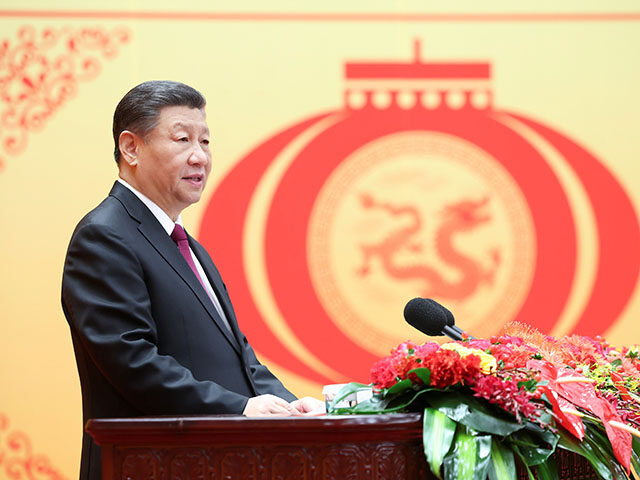Chinese dictator Xi Jinping demanded innovative solutions to China’s growing economic woes in remarks on Tuesday and Wednesday, warning against “a headlong rush into projects and the formation of industry bubbles” that could result in “abandoning traditional industries.”
Xi made appearances at the ongoing “two sessions” of the country’s rubber-stamped lawmaking bodies, the National People’s Congress (NPC) and the Chinese People’s Political Consultative Conference (CPPCC). The NPC can draft and pass laws but is entirely beholden to the leadership of the Communist Party elite, while the CPPCC is advisory in nature and has no real power.
The annual “two sessions” began on Monday with an emphasis on rehabilitating China’s languishing economy. China documented its first-ever decline in foreign direct investment in November – an $11.8-billion fall recorded in the fiscal quarter ending in September – in part as a result of a growing real estate crisis, rising youth unemployment, and growing awareness of the risks of doing business with the genocidal, totalitarian Communist Party. China’s falling status as a premier investment location has been in part at the expense of India, which has aggressively courted multinational corporations based in China with increased success in the aftermath of China’s “zero-Covid policy.”
The solution the Chinese government is touting most enthusiastically to its economic woes is “new quality productive forces,” a self-admitted “buzzword” for technological innovation intended to create entirely new industries for Beijing to dominate. A propaganda video published by the state outlet Global Times described “new quality productive forces” as the answer to “what China is doing to tackle various challenges,” defined as “advanced productivity that is led by innovation.”
Xi reportedly “stressed” the pursuit of “new quality productive forces” but, unlike the many propaganda pieces in state media advancing the concept, emphasized that these potentially lucrative fields in the future cannot come at the expense of the productivity of sectors of the economy that actually exist today.
“Xi called for focusing on high-quality development as the top priority, urging efforts to step up innovation, foster emerging industries,” the Chinese government news agency Xinhua relayed, “adopt forward-thinking plans for developing future-oriented industries and improve the modernized industrial system.”
Xi made the remarks on Tuesday at a meeting of the NPC, the more powerful of the two lawmaking bodies.
The dictator reportedly added, however, that “developing new quality productive forces does not mean neglecting or abandoning traditional industries.”
“It is necessary to prevent a headlong rush into projects and the formation of industry bubbles, and avoid adopting just a single model of development,” Xi asserted.
“We must prevent local rush and oppose irrational, blind investments that create bubbles,” the South China Morning Post quoted him as saying. “Promoting new productive forces doesn’t mean neglecting or giving up traditional industries.”
Among the traditional industries and economic engines Xi specifically mentioned as necessary to improve were “property rights protection, market access, fair competition and social credit to build a high-standard socialist market economy system.”
The reference to “property rights protection” appeared to be a nebulous recognition of the widespread protests that rocked China in 2022 as a result of the demise of the massive real estate developer Evergrande. Evergrande’s value collapsed to a point that, in January, it was ordered to liquidate, leaving as much as $300 billion in debt. Families that had taken out mortgages or signed agreements for Evergrande to build new homes were left stranded, unable to access their funds. In January 2022, protesters stormed Evergrande’s Guangzhou office, demanding their money back for failed projects. Real estate-related protests remained a significant source of civil unrest in 2023, the human rights organization Freedom House documented.
Xi also appeared to reference the flight in foreign direct investment on Tuesday.
“It is also important to foster a world-class business environment that is market-oriented, law-based and internationalized, and create new strengths of a higher-standard open economy,” Xinhua paraphrased the dictator as saying, urging the lawmakers to seek “resolute measures to rectify pointless formalities and bureaucratic practices.”
Xi made an appearance at the CPPCC on Wednesday in which, Xinhua’s report indicated, he did not offer any substantive advice for the conference other than to enthusiastically participate in the summit.
Xi “urged political advisors from different political parties, organizations, ethnic groups, sectors, and all walks of life to conduct in-depth research and actively offer suggestions based on the major strategic tasks” before them, according to Xinhua.
The Chinese government, in collaboration with NPC members, announced that it would set its official 2024 GDP growth target at five percent, only slightly below the 5.2 percent goal for 2023. The goal is below the projection made by the International Monetary Fund (IMF), which is currently projecting a 4.6-percent increase by the end of the year. The IMF identified China’s inability to address “key property sector vulnerabilities” as a significant problem in a February report.
“Many developers have become non-viable but have avoided bankruptcy thanks in part to rules that allow lenders to delay recognizing their bad loans, which has helped mute spillovers to real estate prices and bank balance sheets,” the IMF noted. “Home prices have also decreased only modestly in part because some cities have sought to limit price declines through rules and guidance on listing prices.”

COMMENTS
Please let us know if you're having issues with commenting.